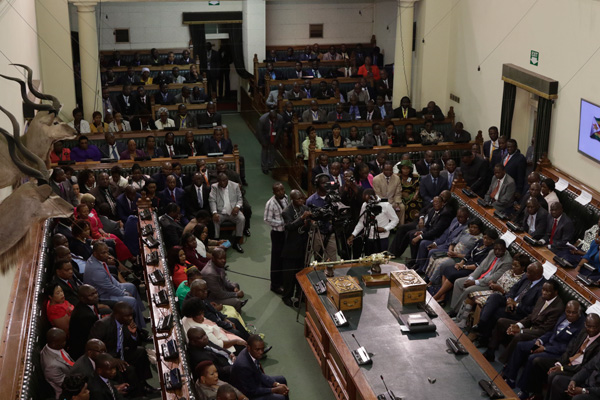
THE Parliament Budget Office (PBO) has expressed concern over the country’s ballooning debt, which is now above $13 billion.
BY VENERANDA LANGA
The development is a violation of provisions of the Debt Management Act, which stipulates that the government debt should not exceed 70% of gross domestic product (GDP), with the debt now estimated at 79%.
The country’s GDP was estimated at $16,3 billion at the end of last year.
In their 2017 first half budget performance and outlook report, the PBO said the government had been increasing its reliance on the domestic market to finance the budget deficit of $535 million, resulting in a large outlay of Treasury Bills worth $2,5 billion currently on the market.
“As at March 31, 2017, the country’s public debt stood at $11,6 billion or 82% of GDP, of which $7,5 billion or 53% of GDP is external debt, while $4,3 billion, representing 30% of GDP, is domestic debt, and of the $7,5 billion debt, $5,2 billion is in arrears,” the PBO report read in part.
“On the other hand, the domestic debt has also increased in the second quarter due to continued issuance of Treasury bonds to finance government expenditure, and this leaves the country debt a figure above $13 billion.”
On the 2017 budget deficit, the PBO said as at August 31, 2017, the budget deficit could actually have accumulated to a figure beyond $1,5 billion because the government owed $1,7 billion worth of goods and services to various line ministries and departments.
- Chamisa under fire over US$120K donation
- Mavhunga puts DeMbare into Chibuku quarterfinals
- Pension funds bet on Cabora Bassa oilfields
- Councils defy govt fire tender directive
Keep Reading
“Government has been increasing its reliance on the domestic market to finance the budget deficit and this explains why a large outlay of Treasury Bills (TBs) worth $2,5 billion are currently on the market.”
The PBO described TBs, which have been used to finance the budget deficit, as fictitious money, adding the heavy reliance on TBs was also hurting banks.
Before, then Finance minister Patrick Chinamasa was transferred to another ministry, he told Parliament that the government had issued TBs worth $2,5 billion to erase legacy debts and capitalise loss-making State enterprises and parastatals, among others.
“The stock of public debt is violating provisions of the Debt Management Act, which provides that outstanding government debt as a ratio of GDP should not exceed 70% at the end of any fiscal year. Moreover, the country runs the risk of defaulting, as the deficit widens, thus putting banks in a precarious position.”
The PBO said TBs held by commercial banks were now unsustainably 1,7 times the level of bank equity capital, up from 1,3 times at the end of 2016.
“The TBs are creating more fictitious money than what is necessary. With commercial banks becoming increasingly fearful and rightfully, so about the potential for TB default, banks have smartly preferred to hold onto physical United States dollars, limiting withdraws and international card transactions.”











